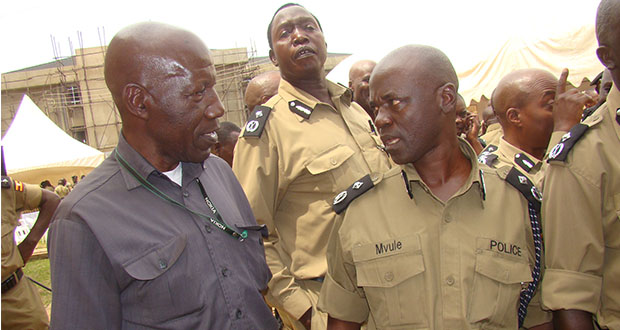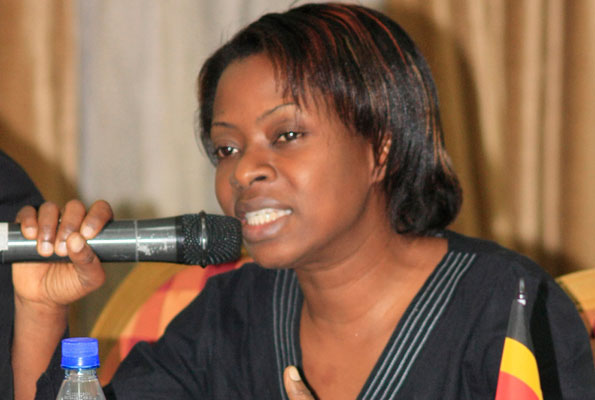The Executive Director of the Anti-Corruption Coalition Uganda Cissy Kagaba has cautioned the Directorate of Criminal Investigation (CID) against summoning seven journalists to record statements following baseless allegations against them by Justine Bagyenda, the former director of supervision at the Bank of Uganda.
Reports in the media indicate that the CID intends to summon the seven journalists to record statements on charges of criminal libel and offensive communication.
The journalists to be summoned work with online publications that have of recent helped expose financial scandals at the Bank of Uganda, leading to the ongoing investigation on the institution by the Auditor General, John Muwanga.
The journalists lined up for the impending summoning are; Richard Wanambwa (Eagle Online), Giles Muhame (Chimp Reports), Deo Senono (Business Focus), Bob Atwine (Spy Reports), Darius Mugisha (Matooke Republic), Andrew Irumba (Spy Uganda and John Njoroge (CEO Magazine).
According to the media reports, police alleges that the journalists from the affected media platforms published leaked bank details as well as mobile money transactions of Ms Bagyenda. Some are alleged to have published photographs of Bagyenda’s real estate properties.
“We ally to the fact that the Uganda Police received a complaint from Justine Bagyenda in respect of publications of her private bank details by some media houses, and it’s on that basis that police has now summoned some journalists to appear before it on 22.5.18,” she said.
Vincent Ssekatte, the Spokesperson of CID has confirmed the summonses written and signed by the deputy director of CID in charge of financial crimes William Wilber Kototyo, who is supposed to have retired on August 8, 2016 but had to plead to renew his public service contract.
“Records available in your file indicate that you were born on 8th August 1956. This means that you clocked the mandatory retirement age of 60 years on 8th August 2016,” former IGP Kale Kayihura reminded Kototyo in a letter over a year ago.
That aside, Ms Kagaba wonders why the CID is planning to summon the journalists, well knowing that the banks acknowledged the authenticity of the bank details. “There is no justice if people cannot see what is happening, media houses in most cases fulfill the first act of justice, and will help ordinary citizens know what is happening,” she says.
“We respect the fact that Bagyenda as a citizen and under the law is entitled to seek redress if and when she feels her rights have been violated, we strongly caution the Uganda police to steer clear of fears and public perception that they are being used by the official to intimidate and gag the media, whose only “crime” is exposing alleged illicit enrichment. In democratic and technologically developed societies the media is an effective weapon in exposing corruption,” she says.
Ms Kagaba has further argued the police to remain professional, neutral and handle the complaint with utmost integrity and regard to public interest. She says public overrides the merits of Bagyenda’s complaint in so far as the public has to know.

“We also urge the Inspectorate of Government together with the Uganda Police to follow up and thoroughly investigate the allegations as published by the media houses against Bagyenda and we continue to salute the gallant men and women of the press for their fearless contribution to the continued struggle of a corruption free country,” she says.
She says corruption has been and continues to be a destructive element in the governance of Uganda and various perception index reports have confirmed as such. “The government continues to have a litany of laws and agencies to address corruption related issues, however much more still needs to be done especially even when the fourth estate is hunted for allegedly exposing the vice,” she says.
With the various pronouncements against corruption, one would expect government to laud any agency or individual that attempted to expose any suspicious corruption tendency, she says. “That would broadly build public trust in government as regards its will to address corruption,” she says.
The above notwithstanding, she has urged the media practitioners to operate within the confines of established laws of the country.
In what appears to be outside of his job description, Wototyo has asked the journalists to appear at the CID with documents such as certificate of incorporation, company licence, articles of association, authorization from the Uganda Communications Commission, details of location of the businesses and details of the company directors.
The affected journalists are not taking the matter lightly and have sought the services of their lawyers, with some advising the CID to send summonses to the legal experts.








